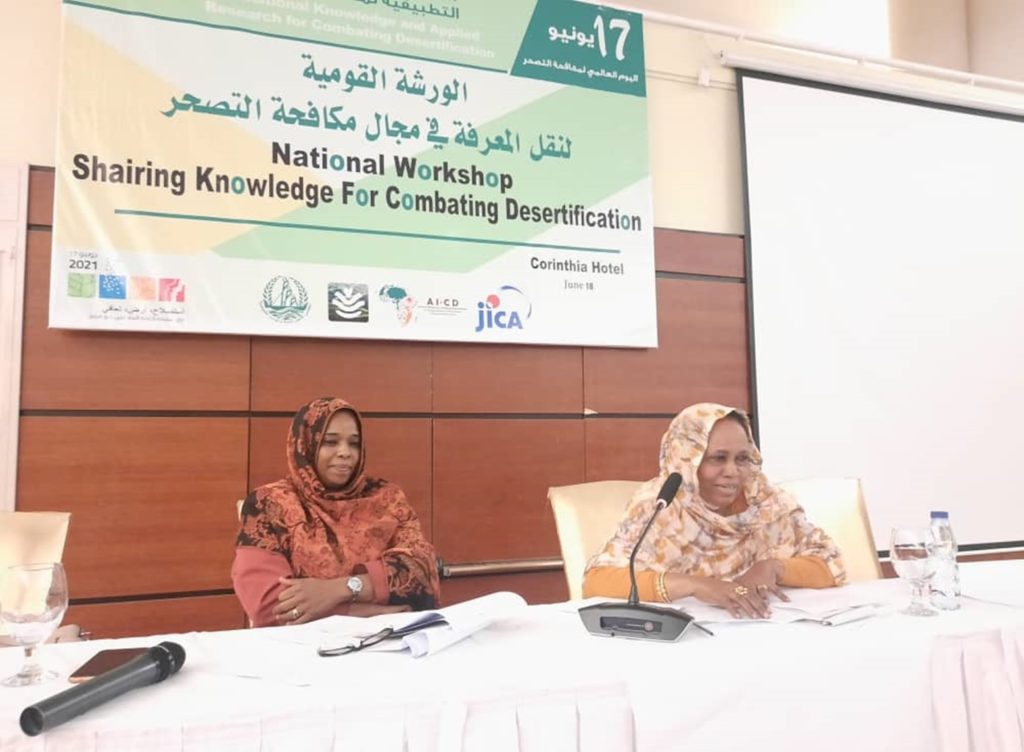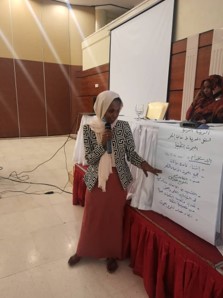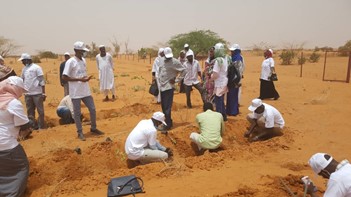16th & 17th June 2021
AI-CD Secretariat Support Team
OVERVIEW
A two-day national workshop was held in Khartoum and El-Rawakeeb in Sudan on 16 and 17 June 2021, hosted by the Higher Council for Environment and Natural Resources (HCENR) of Sudan in cooperation with the Japan International Cooperation Agency (JICA). The objectives were to present the progress and way forward of the ‘’African Initiative for Combating Desertification (AI-CD)”, to enhance networking among stakeholders at both national and state levels, and to present research results, good practices and indigenous knowledge in the field of combating desertification. Some 61 participants attended the workshop, representing various organizations such as national and state government institutions of Sudan, JICA, academic and research institutions, and NGOs. The workshop strengthened the interdisciplinary networks of the stakeholders while promoting accumulation of knowledge on combating desertification through presentations, group discussions, and a field trip to the El-Rawakeeb Dryland Research Station.
HIGHLIGHTS OF DAY 1
(1) Opening session
Ms. Mari Shimizu from JICA Sudan Office made the opening remark on behalf of Mr. Koji SAKANE, Chief Representative of the JICA Sudan Office. The message expressed JICA’s role in the implementation of multiple programmes related to sustainable development in the country and its agency’s will to promote further cooperation in these programs. Additionally, it emphasised the severe multidimensional consequences of desertification, especially the adverse economic and social impacts on agriculture and livestock, and the importance of countermeasures.
Following this, Professor Rashid Hassan, Secretary-General of HCENR / AI-CD Focal Point (FP) for Sudan, highlighted the importance of the country workshop and appreciated the concerted efforts made within the AI-CD framework. Furthermore, he explained the responsibility of HCENR in the preservation and protection of the natural environment through dissemination of traditional knowledge and applied research in the field of combating desertification. Finally, he appealed to all participants to augment their efforts to achieve a balanced development through technical approaches in land and ecosystem restoration as well as legal measures, including the development and implementation of strategies, laws, and regulations.
After that, a virtual presentation on the progress and the way forward of AI-CD activities was given by Mr. Takuya SHIRAISHI, AI-CD Secretariat Support Team. He briefly explained the overview of AI-CD and its geographical coverage in the regions of Sahel and Horn of Africa together with the initiative’s outcomes. In addition, the activities conducted in Sudan were demonstrated, which included the development of project concept notes (PCNs) and meetings with development partners.
(2) Presentation session
Professor Adil Mohamed Ali, Sudanese Environment Conservation Society (SECS), explained the chronological change of the desertification status in Sudan and the multiple countermeasure efforts since the 1940s.
After that, Dr. Mona Dawelbait, Acting AI-CD FP of Sudan, presented the outline of the Sudan National Action Programme to Combat Desertification (SNAP) to highlight similar approaches with AI-CD such as networking, knowledge sharing and access to finance. During her presentation, she illustrated the meaning and purpose of networking and its relation to knowledge sharing. She also expressed the importance of networking at the state, national and regional levels.
Next, Dr. Talaat Magid (University of Bahri) presented early literature, studies and projects related to desertification in Sudan. He also explained some rehabilitation programmes and good practices conducted in several areas of the country, including the traditional land management approach leading to a sustainable agro-sylvo-pastoral system in drylands. Furthermore, he mentioned several scientific journals issued by national, academic and research institutions covering desertification topics. Finally, he expressed the importance of participatory forest management and made recommendations in terms of upscaling collaboration and networking among different institutions in the future.
The presentation on applied research in combating desertification was given by Dr. Iman Al-Rasheed of the National Center for Research (NCR). After discussing information on the desertification status and causes in Sudan, she talked about the diverse research centres and departments focusing on land degradation issues established within several institutions in the country, such as NCR and the Agricultural Research Cooperation (ARC), among others. Furthermore, the outline of the baseline data collection conducted at the El-Rawakeeb Dryland Research Station was presented with emphasis on climate, soil and geomorphology, fauna and flora, water resources, and socioeconomic conditions. Finally, examples of afforestation methods, soil restoration approaches, appropriate irrigation technologies and community engagement approaches were mentioned together with recommendations.
After that, indigenous knowledge for combating desertification and promoting food security was presented by Dr. Abdelnasir Hano (University of Khartoum). He shared the challenges in terms of documentation and dissemination of indigenous knowledge. Furthermore, he illustrated concrete examples of indigenous knowledge, including practices of organic matter recycling, crop rotation, agroforestry farming system, grazing management approaches practiced by pastoralists, and water harvesting techniques. In addition, he provided the importance of traditional expertise on food processing and storage as an approach in promoting food security and reducing poverty to mitigate impacts of desertification.
At the end of the presentation session, Professor Tarig El Gamri (NCR), focused on the discussion of indigenous knowledge in water resources management. After mentioning the natural, social, cultural and religious values of water in ancient civilization, he presented traditional technologies in water management, which are increasingly being abandoned. These technologies included ancient irrigation devices and practices; traditional harvesting methods of rain, floodwater and groundwater; water storage techniques; and water-saving cultivation practices. Moreover, an indigenous community-based mechanism for conflict resolution on resource management was introduced.
(3) Group discussions session
The presentation materials from presenters were first distributed to the participants. Then, the participants were divided into four groups, and each group was requested to develop a proposal on the application and coordination of research and best practices on desertification, and on approaches to collect and disseminate traditional knowledge. At the end of the group session, the proposals were submitted to the organiser for further assessment and potential incorporation in future projects.
(4) Closing session
Dr. Rihab Abdelmageed, Director of the Directorate of Climate Change of HCENR, wrap up the activities and lessons learned from the presentations and discussions. At the end, Dr. Khitma Elawad, Director General of the Department of Resources Sustainability and Conservation of Ecosystem of HCENR, presented the closing remark on behalf of the Secretary-General of HCENR, and concluded the first day of the workshop.
HIGHLIGHTS OF DAY 2
On the second day of the workshop, a field trip to the El-Rawakeeb Dryland Research Station was organised and attended by participants who were joined by officials from relevant authorities, environmental experts, contact points for combating desertification in several states, media personnel, and the local community of El-Rawakeeb. During the visit, speeches were made by the Secretary-General of HCENR, the Deputy Director of NCR, and the representative of the local community. The history and natural features of the area were shared to the participants. Additionally, the components of the research station and previous and on-going programmes and research experiments were presented. Finally, a tree planting activity was initiated, followed by a visit to the meteorological station and the water well.





